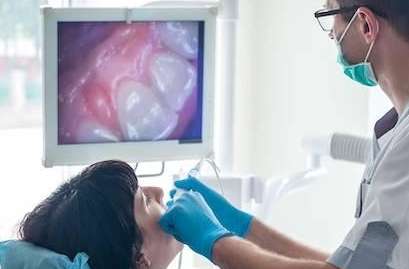Cleanings and Oral Hygiene
Our amazing team of dental hygienists at Dahle Family Dentistry love sharing their passion for healthy smiles with our patients. With expert teeth cleanings every six months, they remove harmful plaque and tartar buildup to keep your teeth and gums healthy.
What Happens during a Teeth Cleaning?
We recommend teeth cleanings every six months for most patients. However, we will personalize your hygiene schedule for your individual needs, which may mean more or less frequent cleanings to maintain healthy teeth and gums.
Our skilled and experienced hygienists are gentle and thorough and perform the following during your cleanings:
- Evaluate your gum health and check for signs of gum disease
- Clean your teeth by removing plaque and tartar buildup
- Review with you any areas you're missing with your at-home hygiene routine
- Explain and demonstrate proper brushing and flossing techniques
- Recommend toothpaste, toothbrushes, or special types of floss to ensure your teeth are thoroughly clean.
- Review your dietary habits and explain how they affect your teeth and gums.
Maintaining excellent oral health requires a team effort, and we're with you every step to ensure happy, healthy smiles that last a lifetime!
How Gum Disease Affects Your Health
Gum disease is highly preventable for most people, yet statistics show that it affects as many as 50 percent of US adults over age 30. Without treatment, gum disease—also called periodontal disease—can progress rapidly.
Untreated gum disease threatens your oral health and puts your overall health and wellness at risk. Significant research has linked gum disease to health conditions like heart and respiratory disease, diabetes, stroke, dementia, and many others.
What Is Periodontal Disease?
Plaque and tartar buildup is filled with bacteria that cause inflammation or infection of surrounding gum tissue. Gum disease can rapidly progress to the advanced form without treatment, leading to gum recession and loss of supporting bone and tissue. Without support, teeth can become loose and may need to be removed.
Periodontal disease is widespread because its symptoms may be so mild that you don't notice them. For this reason, a dental cleaning is often how many patients first learn they have gum disease. However, staying a step ahead of it is easier when you're aware of the symptoms:
- Gums that bleed when you brush
- Gums that look swollen, puffy, or inflamed
- Bad breath that won't go away with mouthwash
- Spaces between your teeth and gums
- Teeth that feel loose
- Gum recession
- A change in the way your teeth feel
If you notice these signs of gum disease, please call and schedule an appointment with a hygienist so they can check it out.
How Do You Treat Gum Disease?
The gum disease treatment we recommend depends on how far it has advanced. Early gum disease is called gingivitis and is reversible if we catch it soon enough. To treat gingivitis, your hygienist will provide a thorough cleaning and review how an improved oral hygiene routine can help you avoid plaque and tartar buildup.
Advanced gum disease is called periodontitis, where the infection targets the structures that hold your teeth in place. Periodontitis is not reversible, and your hygienist would recommend a deep cleaning called scaling and root planing to help prevent it from progressing. You will also require frequent cleanings and treatment to keep periodontitis under control.
Schedule a Teeth Cleaning Appointment
Prompt treatment for gum disease is crucial to avoid problems like gum recession and tooth loss. As a bonus, a healthy mouth that's free of chronic infections may also help you avoid serious health conditions.
If you are due for your next teeth cleaning or have any gum disease symptoms listed above, please call our Treasure Valley dental office to schedule an appointment. We are pleased to serve patients in all surrounding areas in Idaho and Oregon, including Fruitland, Vale, Nyssa, Payette, New Plymouth, and Weiser.



